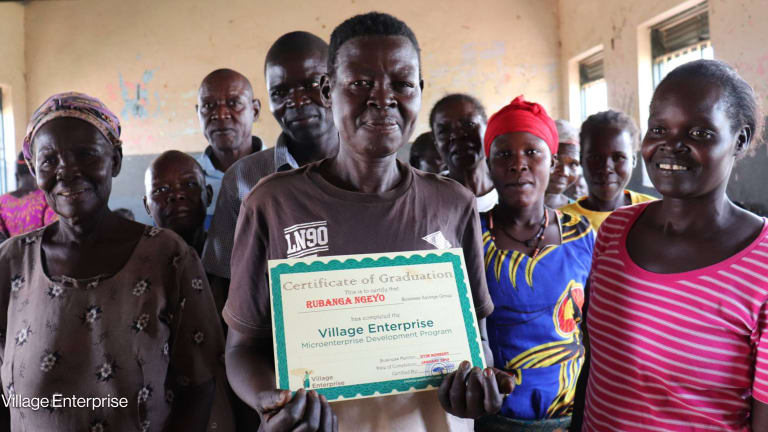Why Save the Children appointed its first chief innovation officer
Maggie Korde is the first chief innovation officer at Save the Children. What does the job involve and why did Save the Children decide to appoint her?
Earlier this year, Save the Children appointed its first chief innovation officer, in a conscious effort to modernize and find better ways of doing things. It may be new ground for the NGO, but it’s not a new area for Maggie Korde, who’s taken on the role. She was already experimenting with how innovation could be used to improve the lives of children during her five years as the organization’s country officer for Rwanda and Burundi. Now, her main task will be to scale the impact of existing innovations and to continue building on what she describes as Save the Children’s legacy of innovation, which in recent years has seen it develop projects pioneering new ways of working across the African continent. During her time as country officer in the Rwandan capital, she set up Kumwe Hub, an innovation incubator hosted within Save the Children, supporting local social enterprises with access to finance and networking. “I felt like there was certainly more we could do in terms of innovative finance and blended finance for children.” It soon became clear that innovative and effective solutions for local challenges were more likely to emerge from local communities than from within a large operation like Save the Children, which has over 25,000 staff members across more than 110 countries. “We’re not best-placed to do everything ourselves,” Korde said. One of the businesses they supported was a local baby porridge maker who was already selling his product through supermarkets and local businesses. The Kumwe Hub gave him a low-interest loan in order to buy a machine that would enable him to produce much more, Korde explained. “Then he was able to serve underserved communities with malnutrition at a much lower profit level, because he was able to sell his product much cheaper and make it much more widely available for people who otherwise wouldn’t be able to afford it.” Beyond financial support, the hub was also created to tackle another issue: while a lot of local businesses — many of them female-led — have great ideas that would solve problems for children across a wide range of issues, “they’re not well networked … they don’t have the Harvard/Yale network, they don’t have the shiny pitch deck,” she said. For each entrepreneur they support through the Kumwe Hub, for example, they create a tailored so-called Wrap Around Support Package, including advisory business development services from different experts, which help them perfect products and put together a compelling pitch to investors. Save the Children also found that business support was cost-effective: organizations that received the support were more likely to repay loans. Betting on innovation For Korde, Kumwe Hub served as a proof of concept that innovation was the direction she wanted to go. “On the back of that, I just became much more interested in how we could do that type of thing throughout the whole of Save the Children,” she said. So when the chief innovation officer role was announced in September last year, “I was happy to throw my hat in the ring for it,” she said. The role, which was designed and appointed before the current funding cuts, is part of a drive to find better ways to reach children, diversify funding sources, and, in general, do more with less, Korde explained. Korde started the role in Kigali, but will be moving in June to Nairobi, which has increasingly become an innovation hub for the continent. Her first priority will be to get together her team to set out a strategy and their goals for children through innovation, said Korde, who also spent a few weeks around Christmas on a “learning tour” connecting with other chief innovation officers both inside and outside the sector. The new appointment counts on senior leadership buy-in, and she’ll be reporting directly to the deputy CEO — something she believes sends “a really important signal because sometimes innovation can be kept on the sidelines or as an afterthought.” When asked why the aid organization — which celebrated its 100th anniversary in 2019 — decided to bet on innovation at this very moment, Korde points to the polycrises affecting children today, including the knock-on effects of the COVID-19 pandemic, the escalating climate crisis, and the fact that we’re living through the highest number of conflicts since WWII. “The reason that this role was seen as important and was designed in the first place is because there has never been a time as tough as this for children,” she said. Embracing frugal innovations and the scaling challenge Amid funding cuts and uncertainty, her team of four is embracing so-called frugal innovations, including exploring how they can use artificial intelligence as much as possible to make up for their small size and ensure the best bang for the buck, she explained. Her team will include an innovation expert who will be monitoring trends, a staffer with a background in monitoring and evaluation whose focus is on impact, and a communicator with the mandate to spread the word about their work. Once in Nairobi, she won’t have to part ways with Kumwe Hub, which is going to come under her global office of innovation, along with three other existing innovation units within Save the Children, including SHIFT, a “campaign accelerator” that supports young people between the ages of 15 and 25 to design and implement their own public campaigns ranging from climate issues to child marriage, “anything that’s important to kids in that community,” she said. Her team will also absorb Indonesian educational technology app Walikuu, which maps school attendance in low-resource contexts to help teachers and schools quickly recognize and act on critical student absences. She’ll also be in charge of the Center for Utilizing Behavioral Insights for Children, or CUBIC, which works with country teams to analyze specific behavioral challenges and design behaviorally informed interventions. Korde sees the biggest challenge as moving innovations from early-stage startups or pilots to scale. But she is excited to explore how Save the Children can enable external players to solve problems for children through innovative finance. “We’re only really scratching the surface of these interventions that Kumwe Hub and others have been able to do,” she said. “I’m excited to see how we can really expand those, replicate them, and bring them to scale.” The process of taking innovations to scale needs to be powered by evidence, she said. While it’s still early days, her role was envisioned to really look at what works, and Korde has plans to start drawing up a potential “what works lab” where proven innovations with firm evidence can be taken to donors and funding partners and where we can say “this is what we know works for children, so let’s go scale it together.”
Earlier this year, Save the Children appointed its first chief innovation officer, in a conscious effort to modernize and find better ways of doing things.
It may be new ground for the NGO, but it’s not a new area for Maggie Korde, who’s taken on the role. She was already experimenting with how innovation could be used to improve the lives of children during her five years as the organization’s country officer for Rwanda and Burundi.
Now, her main task will be to scale the impact of existing innovations and to continue building on what she describes as Save the Children’s legacy of innovation, which in recent years has seen it develop projects pioneering new ways of working across the African continent.
This article is exclusively for Career Account members.
Unlock this article now with a 15-day free trial of a Devex Career Account. With a Career Account subscription you will get:
- Full access to our jobs board, including over 1,000 exclusive jobs
- Your Devex profile highlighted in recruiter search results
- Connections to recruiters and industry experts through online and live Devex events
Start my 15-day free trialAlready a user?
Printing articles to share with others is a breach of our terms and conditions and copyright policy. Please use the sharing options on the left side of the article. Devex Pro members may share up to 10 articles per month using the Pro share tool ( ).
Natalie Donback is a freelance journalist and editor based in Barcelona, where she covers climate change, global health, and the impact of technology on communities. Previously, she was an editor and reporter at Devex, covering aid and the humanitarian sector. She holds a bachelor’s degree in development studies from Lund University and a master’s in journalism from the University of Barcelona and Columbia Journalism School.








